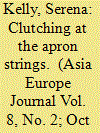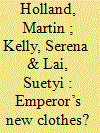|
|
|
Sort Order |
|
|
|
Items / Page
|
|
|
|
|
|
|
| Srl | Item |
| 1 |
ID:
099339


|
|
|
|
|
| Publication |
2010.
|
| Summary/Abstract |
The Asia-Europe Meeting forum (ASEM) was established as a mechanism to facilitate meaningful connections and dialogue between Asia and Europe. In 2010, a new chapter in European-Asian relations is being embarked upon. Standing on the brink of Asia, New Zealand and Australia (alongside Russia) are set to join ASEM. Of the three countries set to join ASEM, New Zealand presents a particular case. Traditionally, New Zealand has been seen as the most British of its former colonies, but it is increasingly both viewed and identifies itself as Asian. Using public opinion surveys and media content analysis conducted in 2009, this article demonstrates that New Zealanders continue to feel a strong connection with Britain which in turn influences its perceptions of the EU. Furthermore, New Zealand's increasing Asian links, coupled with its Commonwealth connections and British heritage, has the potential to positively influence events at ASEM.
|
|
|
|
|
|
|
|
|
|
|
|
|
|
|
|
| 2 |
ID:
167811


|
|
|
|
|
| Summary/Abstract |
In order to adapt to a changing global order, the European Union (EU) has established an important mechanism for cooperating with some of the world’s most influential countries—strategic partnerships (Renard 2012). Four of these partners are Asian—China, India, Japan and South Korea. As a mechanism for understanding the importance of the EU’s strategic partnership agreements in Asia as well as the EU’s potential influence in these countries, this paper examines and compares how the EU’s four strategic partners in Asia view the Union. It identifies similarities and differences in their perceptions of, and attitudes towards, the EU. The paper draws on a methodologically robust data analysis examining three fields of interest in these four countries over 10 years: (1) the filters through which the EU is reported on and understood by the news media in the respective countries; (2) how the EU is perceived by the general public; (3) how the EU is perceived and understood by the national elites in its four strategic partners in Asia. The article demonstrates some similarities and differences across the four strategic partnerships. Firstly, and positively for the EU, the EU’s strategic partnerships in the four Asian countries are viewed as being more than just about a trading relationship for the countries involved. Secondly, these partnerships have been regarded as comprehensive. Thirdly, there was also a noticeable image of an increasingly inwardly occupied EU from 2006 to 2015, hence potentially diminishing the perceived global actorness of the Union. Fourthly, the studied Asian countries considered the EU one of their important partners but ranked it behind the USA and their neighbouring countries. Finally, positive impressions of the EU were also found to have weakened considerably in the past decade.
|
|
|
|
|
|
|
|
|
|
|
|
|
|
|
|
|
|
|
|
|